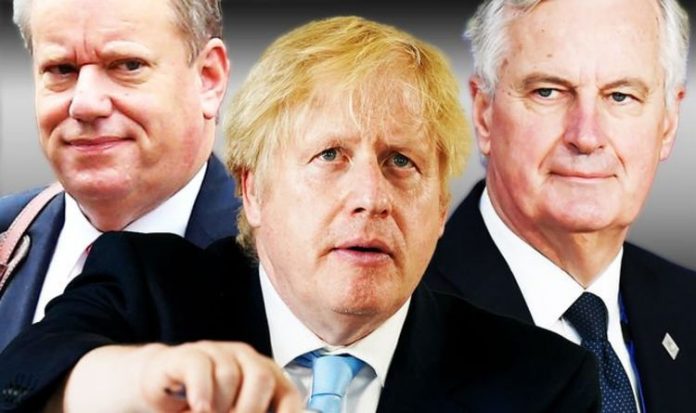Prime Minister Boris Johnson’s announcement of the Internal Market Bill last month intensified trade talks and infuriated those both inside and outside the EU. Yet, the bill has just passed the last Commons hurdle and will now move into the House of Lords before it can pass into law. It has become yet another sticking point in negotiations which are already fraught with disagreements, such as access to UK fishing waters, a level playing field and the governance of any future deal.
The Internal Market Bill is divisive because it overrides elements of the withdrawal agreement — specifically the Northern Ireland Protocol — and so huge parts of pro-EU groups are up in arms.
However, the bill may be part of a larger strategy from Downing Street according to a senior fellow at the Dutch think tank, Clingendael Institute.
Researcher Rem Korteweg tweeted: “Despite (or perhaps, because of) the collapse in trust due to the IM [Internal Market] Bill, a deal between the EU and the UK can still be done.
“But it will come at a cost. And Boris Johnson will have to pay it.”
How is Boris Johnson handling the coronavirus crisis? Vote in our poll
He pointed out that the EU has no intention to freeze the Free Trade Agreement (FTA) talks after the announcement of the Internal Market Bill — but that the bloc will now consider legal action against No.10.
Mr Korteweg said: “Boris Johnson may anticipate this, and ‘want’ it.
“Nothing says ‘I’m tough on Brussels’, than being sued by EU lawyers.”
He noted that the UK is aware the bloc will only sign an FTA if the contentious elements of the Internal Market Bill are removed.
However, writing on Twitter at the weekend, Mr Korteweg added that the “reverse is true as well” — No.10 will only withdraw those elements once the EU has promised to sign a trade deal.
READ MORE: How EU is ‘guilty of breaching withdrawal agreement’
He also pointed out another difficulty which has stemmed from the Internal Market Bill — the EU’s reaction.
He explained: “The EU will now insist on tougher governance safeguards/dispute settlement to underpin a deal.”
Subsequently, it may be easiest for Mr Johnson to pursue no deal at this point — this would help him save face with Brexiteers and avoid an embarrassing U-turn which could reduce his public support.
Another theory is that the Prime Minister does not actually want a deal “and this is all about managing the blame game”.
Mr Johnson has set October 15 as a deadline for an agreement to be reached, and has claimed if no deal emerges he will walk away from negotiations.
The UK will officially leave the EU at the end of this year, with or without a deal.







